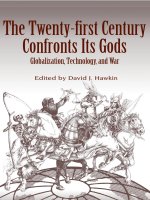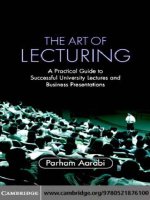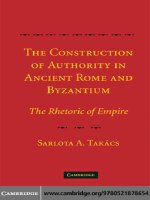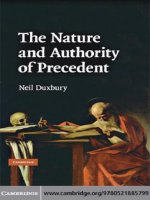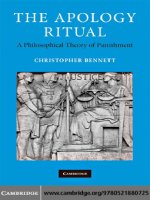0521860512 cambridge university press the price of peace just war in the twenty first century mar 2007
Bạn đang xem bản rút gọn của tài liệu. Xem và tải ngay bản đầy đủ của tài liệu tại đây (2.54 MB, 360 trang )
This page intentionally left blank
THE PRICE OF PEACE
Lively political and public debates on war and morality have been
a feature of the post-Cold War world. The Price of Peace argues that a
re-examination of the just war tradition is therefore required. The authors
suggest that, despite fluctuations and transformations in international
politics, the just war tradition continues to be relevant. However, they
argue that it needs to be reworked to respond to the new challenges
to international security represented by the end of the Cold War and
the impact of terrorism. With an interdisciplinary and transatlantic
approach, this volume provides a dialogue between theological, political,
military and public actors. By articulating what a reconstituted just war
tradition might mean in practice, it also aims to assist policy-makers and
citizens in dealing with the ethical dilemmas of war.
C H A R L E S R E E D is the International Policy Adviser to the Church of
England’s Mission and Public Affairs Unit. He is a specialist on the ethics
of war and peace and is the author of Just War? (2004).
D A V I D R Y A L L is the Assistant General Secretary to the Catholic Bishops’
Conference of England and Wales.
THE PRICE OF PEACE
Just War in the Twenty-First Century
Edited by
CHARLES REED AND DAVID RYALL
CAMBRIDGE UNIVERSITY PRESS
Cambridge, New York, Melbourne, Madrid, Cape Town, Singapore, São Paulo
Cambridge University Press
The Edinburgh Building, Cambridge CB2 8RU, UK
Published in the United States of America by Cambridge University Press, New York
www.cambridge.org
Information on this title: www.cambridge.org/9780521860512
© Cambridge University Press 2007
This publication is in copyright. Subject to statutory exception and to the provision of
relevant collective licensing agreements, no reproduction of any part may take place
without the written permission of Cambridge University Press.
First published in print format 2007
ISBN-13
ISBN-10
978-0-511-27396-4 eBook (EBL)
0-511-27396-7 eBook (EBL)
ISBN-13
ISBN-10
978-0-521-86051-2 hardback
0-521-86051-2 hardback
ISBN-13
ISBN-10
978-0-521-67785-1 paperback
0-521-67785-8 paperback
Cambridge University Press has no responsibility for the persistence or accuracy of urls
for external or third-party internet websites referred to in this publication, and does not
guarantee that any content on such websites is, or will remain, accurate or appropriate.
CONTENTS
Notes on contributors
page viii
Foreword by Richard Dannatt
Acknowledgements
1
Introduction
xi
xvii
1
CHARLES REED AND DAVID RYALL
A framework for ethical decision making: state and
civil society-based approaches
17
PART I
2
The development of just war thinking in the post-Cold War
world: an American perspective
19
GEORGE WEIGEL
3
Is there a European approach to war?
37
WILLIAM WALLACE
4
Between development and doubt: the recent career of just
war doctrine in British churches
55
NIGEL BIGGAR
5
Just war thinking in recent American religious debate over
military force
76
JAMES TURNER JOHNSON
P A R T II
6
Responding justly to new threats
Humanitarian intervention
DAVID FISHER
v
101
99
vi
CONTENTS
7
Terrorism
118
JEAN BETHKE ELSHTAIN
8
Rogue regimes, WMD and hyper-terrorism: Augustine
and Aquinas meet Chemical Ali
136
PAUL SCHULTE
9
Moral versus legal imperatives
157
FRANK BERMAN
P A R T III
10
Fighting wars justly
177
The ethics of ‘effects-based’ warfare: the crowding out of
jus in bello?
179
PAUL CORNISH
11
The just conduct of war against radical Islamic terror
and insurgencies
201
TERRENCE K. KELLY
P A R T IV
12
Securing peace justly
217
Justice after war and the international common good
219
JOHN LANGAN
13
Conditions for jus in pace in the face of the future
GWYN PRINS
14
From just war to just peace
255
MARY KALDOR
PART V
15
Concluding reflections
A US political perspective
275
277
MICHAEL O. WHEELER
16
A British political perspective
286
MICHAEL QUINLAN
17
An American military ethicist’s perspective
SHANNON E. FRENCH
295
236
vii
CONTENTS
18
A British theological perspective
RICHARD HARRIES
Bibliography
Index
323
313
304
CONTRIBUTORS
is a barrister at Essex Court Chambers, international
arbitrator and Judge ad hoc of the International Court of Justice. He chairs
the Claims Committee of the Austrian General Settlement Fund for Victims
of Nazi Persecution. Through the 1990s he was the Legal Adviser to the
Foreign and Commonwealth Office and is presently Visiting Professor of
International Law at the University of Oxford.
FRANK BERMAN
is Professor of Theology and Ethics in the School of
Religions and Theology at Trinity College, Dublin. He is author of ‘On
Giving the Devil Benefit of Doubt’, in William J. Buckley (ed.), Kosovo:
Contending Voices on Balkan Conflicts (2000) and editor of Burying the Past:
Making Peace and Doing Justice after Civil Conflict (2003).
NIGEL BIGGAR
P A U L C O R N I S H is Carrington Chair in International Security at Chatham
House and Head of the International Security Programme.
J E A N B E T H K E E L S H T A I N is the Laura Spelman Rockefeller Professor of
Social and Political Ethics at the University of Chicago. She has written
widely on feminism, women and war. Her books include Just War against
Terror: Ethics and the Burden of American Power in a Violent World (2003),
Democracy on Trial (1995) and Women and War (1988).
was the Deputy Head of the Defence and Overseas Affairs
Secretariat in the United Kingdom’s Cabinet Office. Prior to that he was the
Under-Secretary of State in the Ministry of Defence responsible for defence
equipment. He was the Defence Counsellor in the UK Delegation to NATO,
where he helped to revise Alliance Defence policies and strategy following
the end of the Cold War. He is currently Strategy Director for EDS, the
global information technology services company. He regularly contributes
to books and journals on defence and ethical issues. He is the author of
Morality and the Bomb (1985), a study of the ethics of nuclear deterrence
written while he was a Research Fellow of Nuffield College, Oxford.
DAVID FISHER
viii
CONTRIBUTORS
ix
SHANNON E. FRENCH
is an Associate Professor of Philosophy in the
Department of Leadership, Ethics and Law at the United States Naval
Academy. She is the author of The Code of the Warrior: Exploring Warrior
Values, Past and Present (2003) and numerous articles and book chapters in
the field of military ethics.
is the Bishop of Oxford. He is also President of the
Council on Christian Approaches to Defence and Disarmament. He
chaired the Church of England’s Working Party on Peacemaking in a
Nuclear Age (1988) and has written a number of books on the ethics of
war, most notably Christianity and War in a Nuclear Age (1986). He chaired
the Church of England’s House of Bishops’ Working Party on Countering
Terrorism: Power, Violence and Democracy Post 9/11 (2005).
RICHARD HARRIES
is Professor of Religion and a member of the
graduate faculty in Political Science at Rutgers University. His books
include Can Modern War Be Just? (1997) and Morality and Contemporary
Warfare (2002).
JAMES TURNER JOHNSON
is Director of the Centre for the Study of Global Governance
at the London School of Economics and author of numerous books on war
and democracy. Her recent works include New and Old Wars: Organised
Violence in a Global Era (2002) and Global Civil Society: An Answer to War
(2003).
MARY KALDOR
T E R R E N C E K . K E L L Y is a Senior Researcher with RAND and a retired army
officer. In 2004 he served as the Director for Militia Transition and
Reintegration Programs for the Coalition Provisional Authority in Iraq.
He is currently serving as the Director for Strategic Planning and
Assessment for the US Mission in Iraq.
holds the Cardinal Bernardin Chair of Catholic Social Thought
at the Kennedy Institute of Ethics at Georgetown University and is a member
of the faculty of the Walsh School of Foreign Service at Georgetown. He edited
with William V. O’Brien The Nuclear Dilemma and the Just War Tradition
(1986) and participated actively in the debate over the US Catholic Bishops’
Pastoral Letter The Challenge of Peace (1990). He has written extensively on
human rights, just war theory and Catholic social teaching.
JOHN LANGAN
is Alliance Research Professor jointly at the London School of
Economics and Political Science and at Columbia University, New York.
GWYN PRINS
x
CONTRIBUTORS
He is author of many works on global security, most recently The Heart of
War: On Power, Conflict and Obligation in the Twenty-First Century (2002).
is a former Permanent Under-Secretary of the United
Kingdom Ministry of Defence, and former Director of the Ditchley
Foundation. He is currently a visiting professor at the International Policy
Institute Centre at King’s College, London and a Consulting Senior Fellow
for South Asia at the International Institute for Strategic Studies.
MICHAEL QUINLAN
is the International Policy Adviser to the Church of England’s
Mission and Public Affairs Unit. He is the author of Just War? (2004).
CHARLES REED
D A V I D R Y A L L is Assistant General Secretary to the Catholic Bishops’
Conference of England and Wales. He has published articles in journals
such as International Relations, Third World Quarterly and the World Today.
P A U L S C H U L T E is a Senior Visiting Fellow at the UK Defence Academy.
He was formerly Head of the Post-Conflict Reconstruction Unit in the
Department for International Development, Director of Proliferation and
Arms Control in the Defence Ministry, and UK Commissioner on
UNSCOM (United Nations Special Commission) and UNMOVIC
(United Nations Monitoring, Verification and Inspection Commission).
is Professor of International Relations at the London
School of Economics and a Liberal Democratic peer. He has written widely
on European security and the politics of the European Union.
WILLIAM WALLACE
is a senior fellow of the Ethics and Public Policy Centre in
Washington, where he holds the John M. Olin Chair in Religion and
American Democracy and is head of the Catholic Studies project. He is
author of Idealism without Illusions: US Foreign Policy in the 1990s (1994)
and Moral Clarity in a Time of War (2003).
GEORGE WEIGEL
MICHAEL O. WHEELER
is a consultant and writer on US national security
issues and a retired US Air Force officer. He has been the arms control
adviser to the Chairman of the Joint Chiefs of Staff and a member of the
National Security Council staff, as well as directing the ethics course at the
US Air Force Academy in the early 1970s.
FOREWORD
RICHARD DANNATT
Successive generations in the twentieth century confronted the prospect
of war as an ugly but inevitable characteristic of their times. The tone
was set by the Boer War, became harsher in the First World War, more
universal in the Second World War and took on the potential for total
destruction in the Cold War. But then, despite what many saw as the
aberration of the first Gulf War in 1990–1, there appeared to be the
prospect of an era when swords could indeed be beaten into ploughshares,
peace dividends taken and a belief that the likelihood of war – hot or cold,
declared or undeclared – had receded. However, 9/11 shattered the last
vestiges of that dream. But on reflection, the audit trail to the contemporary security situation had already been marked out.
Although the collapse of the Berlin Wall was the headline event that
signalled a switch from the classic focus on Defence to an increasing
emphasis on Security, the use of force to achieve political ends did not
cease but merely began to change. With certain exceptions in sub-Saharan
Africa and in the Middle East, the prospect and incidence of inter-state
war sharply declined, while wars amongst the people became a hallmark of
the last decade of the twentieth century and on into the first decade of the
twenty-first. Moral consciences, pricked by the ubiquity of the international media, have led to a marked increase in military interventions
predominantly under the multinational banners of institutions such as
the United Nations, the European Union and NATO or within the construct of ad hoc ‘coalitions of the willing’. This has certainly been the
experience of the British armed forces and also of the armed forces of
many Western and former Eastern bloc industrialised nations who have
chosen to apply their residual military capabilities not against each other
but in support of the less fortunate. The swords have not become ploughshares but in an innovative way more akin to pruning hooks; they are
being used to try to contribute to prosperity and stability and not merely
to threaten or destroy. If there has been a ‘revolution in military affairs’ in
xi
xii
FOREWORD
recent times it is as much about the ways that armed forces are used as
about the capabilities available to them.
But an acceptance of the moral responsibility to intervene does not
itself provide a solution. Thousands died at Srebrenica and tens, probably
hundreds, of thousands died in Rwanda because the military means were
not made available in sufficient quantities to support the political intent.
‘Never again’ was the reaction, and this response has led to a growing
acceptance of the responsibility to protect human rights wherever they are
threatened. This book is therefore timely as it seeks to re-examine, from
first principles, the ethical context of the use of force in the current
security climate. Responsible policy-makers and military commanders
need the mutual confidence that what they set out to do remains not
only legal, but morally and ethically sound.
It is not for me to speak for policy-makers; but from the perspective
of the military commander these ethical issues are personal and urgent.
Responsibility for a plan or a series of operations can never be delegated.
Activity can be delegated to subordinates but never responsibility. Both I and
General Sir Rupert Smith, who also addressed the authors’ conference at
Church House when this book was being shaped, have had first-hand experience of operations in Bosnia, Kosovo and Northern Ireland and know that
whereas physical courage is a basic requirement for a soldier – and Private
Johnson Beharry VC comes to mind – it is the moral courage to do the right
thing that is the harder challenge. A salutary and negative example is that of
Major-General Radislav Krstic, the Bosnian Serb Commander of the Drina
Corps whose troops carried out the Srebrenica massacres in 1995. I gave
evidence at his trial before the International Criminal Tribunal for the former
Yugoslavia in The Hague, and by the end of that trial, I believe the prosecution knew, the court knew and even he probably knew that his major failing
was not to refuse to carry out the instructions given to him by his superiors
which inevitably led to the death of some 8,000 Muslim men and boys.
Nuremberg should have taught him that his defence was not a defence. I
repeat: responsibility can never be delegated; and seen from where I stand, the
moral dimension is highly personal.
If, therefore, the moral dimension to the use of force is of increasing
importance in the contemporary security environment then so too is the
premium placed on intellectual preparation to take part in modern, postindustrial warfare. A book such as this will contribute significantly to this
process, mirroring in part the greater emphasis placed within the British
FOREWORD
xiii
Army, and the British armed forces generally, on a proper doctrinal
understanding of the application of military force.
Until the closing years of the Cold War, the British Army had no
formally articulated military doctrine – instead, the basis of belief and
conduct was largely rooted in past practice: the army was popularly held
to be pretty efficient at preparing for the last war, not too bad at a
preparing for the current one but not that good at looking ahead! But in
the last fifteen years thought has moved on. Without dwelling unduly on
history, in the last decade of the Cold War there was a growing realisation
that there had to be an alternative to the cataclysmic nuclear options and
more time, thought and resources were put into developing conventional
battlefield concepts. Within the British Army, General, then later Field
Marshal, Sir Nigel Bagnall led the intellectual charge which culminated
in the first comprehensive written doctrine which in turn provided the
rationale for an enhanced equipment programme and a new approach to
training and war fighting. At the heart of this approach was a deliberate
focus on the operational level of war – the level between the strategic and
the tactical – the level at which Generalship is exercised and all activity is
orchestrated within a single campaign plan.
And this linkage between political intent and the application of force on
the ground has served the military well. In each new situation the attempt
has been made to plan events beginning with a vision of the end state,
identifying the effects that are required to achieve it and working back
from there. In parallel to this renewed focus on a doctrinal approach to the
application of force has been an intellectual struggle to broaden the debate
so as to embrace the challenges of peace-keeping as distinct from war
fighting. But heroic attempts during the mid-1990s against the illogical
background of the conflicts in the Balkans failed to square the circle and
could not provide neat definitions for alternate scenarios. The reality of
the early months of the second Gulf War in 2003 showed the unity of all
military operations with simultaneous but different activities taking place
in adjacent parts of the battlefield, or even city blocks – war fighting,
humanitarian relief and peace support operations – the genesis of the
so-called ‘Three-Block War’.
Such a description of contemporary operations masks the underlying challenges for the development of the physical means of modern
military force. The extent to which any nation can join a ‘Revolution
in Military Affairs’ is ultimately enabled or constrained by the size of the
xiv
FOREWORD
national budget devoted to defence. Successive British governments have
set their priorities, challenging defence to be both effective and efficient,
and to regard operations with allies and coalition partners as the norm.
That said, a small deployment such as that to Sierra Leone in 2000
demonstrated that modest but timely action can bring disproportionate
benefit, especially when linked to speedy strategic and operational level
decision making. However, the norm will be multinational action often
led by the United States, who are forging ahead on all technological fronts.
In Britain we accept that we will never fight ‘as’ the Americans, but we do
recognise the requirement to fight ‘with’ the Americans, and recent
experience shows that this is perfectly possible. However, we are all agreed
that future warfare will increasingly be intelligence- and information-led,
an orchestration of specific effects aligned to specific purposes, and all
brought together on a network basis. The day of the ‘Big Battalions’ is not
over, but the synchronisation of the precise use of force is most likely to
ensure that our professional skills are turned to our advantage and our
conventional mass – still needed in some manpower-intensive circumstances – does not become our Achilles’ heel.
But whatever the means of war, the just war questions remain, promoting
a contemporary re-examination of just cause, just conduct and the establishment of a just peace – and at the same time there is the realisation that the
cast list of key players has also been expanded. The classic understanding of
the inter-play between the strategic, operational and tactical levels of war
placed greater emphasis and responsibility on those at the upper end of the
process. This is not exclusively so today, as the actions of a corporal or a pilot
apparently conducting tactical activity can have profound operational and
strategic consequences. Thus, the requirement for moral and ethical understanding becomes more pressing and widespread as the effect of the actions
of the ‘strategic’ corporal or pilot might be as easily visible to the international media as the actions of the general or the politician. Educating the
‘strategic’ corporal and pilot to understand his moral responsibilities is now
a key challenge for the military leadership.
In past generations it was assumed that young men and women
coming into the armed forces would have absorbed an understanding of
the values and standards required by the military from their family or
from within their wider community. Such a presumption today cannot
be made. When a political decision is reached to send a military force
on a discretionary intervention there is a conscious or subconscious
FOREWORD
xv
acceptance that in deploying to a less fortunate part of the world, we do so
having publicly adopted a position on the moral high ground. However,
when officers or soldiers act in a way contrary to our traditional values and
standards and fail to respect the human rights of those they have gone to
help, then we risk falling from the high ground to the valley, often in a very
public way. The challenge now for the military leadership is to educate
and train our young people of today – each one a potential individual
decision-maker – so that all concerned understand the rationale behind
our core values of selfless commitment, courage, discipline, integrity,
loyalty and respect for others, and apply these values to their conduct.
Without an individual moral understanding from all concerned within
a military endeavour, from policy-maker to private soldier, then the
outcome will be in doubt in both war and peace. But where we get it
wrong, when there are lapses in behaviour and conduct, then they must be
confronted. Investigation must be thorough. Well-informed decisions
must be taken about possible prosecutions and timely disposal throughout the judicial system must follow. Those in the chain of command, from
top to bottom, have a duty to support all individuals for whom they are
responsible throughout this process; but ultimately individuals must
accept responsibility for their own actions. The peculiar conditions and
atmosphere of military operations underline why it is imperative that
potential offences on operations are tried within a military criminal
judicial system according to the burden of civil, military and international
law – itself a more rigorous criteria than in civilian life.
But individual moral responsibility and understanding are not sufficient of themselves unless the corporate or collective moral understanding
is sound too. Napoleon observed in his day that the moral is to the
physical as three is to one, and in so doing I believe he was commenting
both individually and collectively: the cause must be just, and be understood to be just, in order to gain this beneficial multiplier effect that leads
to overall success. In the dark days of 1940 the physical odds against
Britain were alarmingly high, and in the more sobering moments of the
Cold War the military balance was tilted away most unfavourably; but
ultimately fascism and communism were defeated. The Second World
War and the Cold War were fundamentally moral conflicts – clashes of
ideas – ‘the difference between truth and lies that makes people commit
their best energies and risk their lives and safety in resisting oppression
and deceit’. Those were the words of the Archbishop of Canterbury, the
xvi
FOREWORD
Rt Revd Rowan Williams, in his address at the service in Westminster Abbey
on Sunday 10 July 2005 to mark the sixtieth anniversary of the end of the
Second World War. It is ironic that the moral challenge to this generation
had come to the streets of London only three days before on what we know
popularly as 7/7. But Archbishop Rowan Williams also referred to ‘the
passion that was generated during the darkest days of the War, a passion
to see human dignity vindicated after an age of insult and disfigurement.
That passion will have been rekindled in recent days.’ It is perhaps a sad
but inevitable comment on the history of humankind that successive generations must confront the clash ‘between truth and lies’, but it is most
timely that the Church of England Archbishops’ Council and the Catholic
Bishops’ Conference of England and Wales set up their conference and this
resultant book entitled The Price of Peace: Just War in the Twenty-First
Century.1 I am glad that the contributors have not ducked the difficult issues.
My original invitation to take part in the conference and subsequently
the invitation to write this foreword came from the late Major-General the
Reverend Ian Durie, tragically killed in a car crash in Romania just a few
weeks before the conference. He had commanded the British Artillery in
the First Gulf War, subsequently been ordained and at the time of his
death was visiting Romania to promote spiritual and moral understanding within their army. Of this conference, to which he had intended to
contribute, he expressed his hope to try to ‘bring a much better understanding of this critical subject – the theology of just war and its relevance
today – to help the Church to speak prophetically into this crucial area’.
Ian Durie felt passionately about the need for a contemporary understanding of what just war permitted and constrained. But at the heart of the
matter – the Centre of Gravity, as the military call it – are people. War has
traditionally been fought between people, now increasingly it is fought
amongst people, but ultimately it is fought by people. The conceptual dimension of war has constantly changed, the physical means of war have become
ever-deadlier, but the moral component of war – people – has remained as the
central element. What people think they can achieve by war, how people
conduct themselves in war and how people set about restoring peace – it is our
response to these questions that ultimately defines our humanity.
General Sir Richard Dannatt KCB CBE MC ADC Gen
Chief of The General Staff
1
Archbishop Rowan Williams, sermon in Westminster Abbey, Sunday, 10 July 2005.
ACKNOWLEDGEMENTS
Whilst the editors and contributors all write in a personal capacity, this
book would not have progressed without the support and encouragement
of the Archbishops’ Council’s Mission and Public Affairs Division and the
International Affairs Department of the Catholic Bishops’ Conference of
England and Wales. Our particular thanks go to Tom Burns, Tom Butler,
John Clark, William Fittall, Philip Giddings, Jeremy Harris, Crispian
Hollis, Austin Ivereigh, Patrick Kelly, Tim Livesey, Chris Smith, Andrew
Summersgill, Frank Turner, Stephen Wall, and especially Ian Linden who
moderated the symposium. Thanks are also due to Rupert Smith, Charles
Guthrie and Nicolas Maclean. As editors of this collection, and charged
with the task of drawing together the contributions, our chief thanks go to
all our authors for offering their time so generously to this project. Our
task was made immeasurably easier by the goodwill and humour which all
contributors displayed throughout the editorial process. This collection
was the result of a three-day authors’ symposium held in London, in May
2005. This symposium would not have been the success it was without the
excellent administrative support provided by Alison Cundiff, Larissa
Doherty and Maria Klos. We are also grateful to John Haslam and Kate
Brett of Cambridge University Press. Finally, this book would not have
been possible without the loving and patient support of our respective
friends and family, especially Rebecca and Haleh, Nima and Sophie.
xvii
1
Introduction
CHARLES REED AND DAVID RYALL
The genesis of this book lies in a March 2005 symposium on the ‘Just War
in the Twenty-First Century’ and the context for the encounter was the
2003 Iraq War, a conflict that helped to crystallise in the most acute way
the recurring moral, political, legal and military tensions that are involved
in the recourse to and conduct of war. Historically, the framework used
most frequently to explore these issues has been the just war tradition1 and
the symposium aimed to facilitate a transatlantic dialogue involving a
diverse range of participants on the ethics of war and peace with a view to
investigating and renewing that tradition as part of a broader public
conversation.
The starting point of the symposium, as well as of this book, is the
premise that the just war tradition remains an indispensable framework
for analysing global order, peace and security. In our view, it is critical to
see just war thinking as a dynamic tradition for reflecting on the nature of
international society rather than as a set of prescriptions to be rigidly
applied to crises, a sort of checklist that can be ticked or crossed. Even
more fundamental to the volume is the belief that conflict tragically
remains an inextricable part of both intra- and inter-state relations.
Therefore, trying to understand such a fundamental phenomenon is itself
a moral obligation and the just war remains the best way to do so. Allied to
this is the sense that moral reflection and action must remain at the heart
of politics and that a properly understood just war tradition can play a
significant role in shaping public discourse about the values and ends of
political communities. Thus, properly understood the tradition becomes,
1
The other element within the Christian tradition is pacifism. Perhaps the foremost British
thinker within that strand was the late Sydney D. Bailey. See, for example, War and Conscience
in the Nuclear Age (Basingstoke: Macmillan, 1987). One of his legacies remains the continuing
work of the Council on Christian Approaches to Defence and Disarmament, which he helped
to found and to which several of the contributors to this volume belong.
1
2
THE PRICE OF PEACE
above all, an exercise in practical wisdom about the nature of international society and fundamental questions such as intervention. Yet war
remains what it has always been, ‘a defeat for humanity’ in the words of
Pope John Paul II, and just war thinking should never be seen as an
attempt to moralise war with the intention of making it easier to fight.
Nor can the tradition answer the interlinked security questions that face
us about the environmental crisis, disease and poverty and the corresponding moral imperative to realise objectives such as the Millennium
Development Goals or more effective conflict prevention. However,
focusing on war explicitly allows us to address what remains a fundamental aspect of the human experience and using just war thinking allows, in
Bryan Hehir’s words, for ‘a two–dimensional ethic’ that addresses both
policy-makers and the conscience of individual citizens.2
It is arguable that the just war tradition underwent a narrowing during
the Cold War that deformed its utility as a guide to action. The overwhelming shadow of the US–Soviet confrontation understandably shaped
the very grammar of our moral language in a way that focused almost
exclusively on nuclear weapons. Yet, with the ending of the Cold War and
the emergence of radically different threats, the tradition needs to be
re-examined. We asked the contributors to this volume to explore
whether or not the just war tradition continues to be relevant given the
changing nature of international relations. If it is relevant, how can the
tradition be reworked in order to provide a framework for practical reflection? The continuing need for dialogue between political and public actors
was evident in the fierce debate over the 2003 Iraq War. The symposium
sought to encourage such a dialogue by providing a space in which theologians, political and military analysts could consider how a re-energised just
war tradition might assist policy-makers and the wider public to grapple
better with the moral and political dilemmas of war.
Because that fundamental shift has occurred in the structure of conflicts, away from inter-state ‘industrial warfare’ to something as yet to be
determined, there is an even greater need to explore the relationship
between moral theory and practice. In view of this, the book takes an
interdisciplinary approach in the belief that the insights from one discipline and culture should usefully contribute to and further the debate in
2
Fr Bryan Hehir, ‘The Politics and Ethics of Nonproliferation’, CISAC’s Annual Drell Lecture,
Stanford University, 6 December 2005, p. 4.
INTRODUCTION
3
another. Such an interdisciplinary approach has been central to the long
development of the just war tradition as a body of moral reflection, rooted
in Christian theology and natural law, that has evolved through a dialogue
between secular and religious sources. That conversation between diverse
and competing actors, whether theologians, military commanders or
politicians, means that the tradition represents more than just a set of
moral assumptions or ideals. Participants within this dialogue have
always sought to shape and maintain the tradition to give it renewed
meaning when faced with new security challenges. This dialogue has
shaped methods of statecraft and rules of military engagement while still
providing guidance to conscientious individuals grappling with the
terrible moral dilemmas posed by war.
In its simplest form, the tradition argues for certain conditions and
criteria to be met before any military action occurs. It has two thematic
branches, classically denoted by the terms jus ad bellum and jus in bello. Jus
ad bellum as generally understood today consists of seven principles,
which need to be met to justify the resort to war. They include that war
must have a just cause, be waged by a proper authority and with a right
intention, be undertaken only if there is reasonable chance of success and if
the total good outweighs the total evil expected (i.e. overall proportionality). It must also be used as a last resort and be waged in the pursuit of
peace. In contrast, jus in bello is defined by two concerns: discrimination,
or avoiding intentional harm to non-combatants, and proportionality of
means, which implies using such force as is essential to achieve an objective that is itself necessary.
The history of just war thinking suggests that these criteria will atrophy
if they are not reworked and then applied afresh in the unprecedented
context of the contemporary international environment. One recent
example of this reworking is that provided by the philosopher Michael
Walzer. Arguing about War revisits many of the arguments that Walzer
made some thirty years previously in Just and Unjust Wars.3 Faced with
the sheer number of recent horrors such as Rwanda, Kosovo and the
Sudan, he finds himself defending the right to intervention, a right that
he previously opposed. This in turn leads him to sanction long-term
3
Michael Walzer, Arguing about War (New Haven: Yale University Press, 2004). Michael
Walzer, Just and Unjust Wars: A Moral Argument with Historical Illustrations (New York:
Basic Books, 1977).
4
THE PRICE OF PEACE
military occupations in the form of protectorates and trusteeships. Taken
together, these shifts result in Walzer questioning whether the just war
tradition needs to be expanded to include a third branch, namely jus post
bellum, to help address many of the issues that have arisen in post-conflict
situations like East Timor and Iraq.
Walzer’s efforts are reflective of a wider uncertainty as to what constitutes a just war in the twenty-first century, as witnessed, for example, by
the work of Michael Ignatieff.4 The traditional image of a country’s armed
services constituting a war-fighting machine designed and equipped to
achieve a decisive military victory on the battlefield in order to ‘solve’ the
original political problem that necessitated the military deployment in the
first place sits oddly with post-Cold War reality. It is difficult now to
identify not only the battlefield but also who or what is the ‘enemy’.
Military force is more often than not employed ‘in the presence of
civilians, against civilians’, and most importantly ‘in defence of civilians’.5
Using military force to resolve an international political dispute has
increasingly given way to the aim of creating by force the conditions in
which peace might be restored and then maintained by non-military
means. This is a prolonged and painful process, as, for example, in
Bosnia, which takes years, involving political and military skills and
equipment quite distinct from those required in the past.
If, as General Sir Rupert Smith argues, the end of the Cold War made
obsolete the dominant industrial model of warfare, and with it the industrial army that underpinned it, then it is necessary to rethink what constitutes a justified war, even if war in the conventional sense perhaps no
longer exists. The shift from heavy industrial warfare, characteristic of the
nineteenth and twentieth centuries, to war amongst the people poses
several distinct challenges that need to be resolved as part of a public
conversation if military force is to have any moral basis.
Most public and political debate regarding military matters is restricted either to contesting defence budgets or to debating the legality of
a particular use of force. These debates are an important part of any
4
5
Michael Ignatieff, The Warrior’s Honour: Ethnic War and the Modern Consciousness (London:
Vintage, 1999). Michael Ignatieff, Empire Lite: Nation Building in Bosnia, Kosovo, Afghanistan
(London: Vintage Books, 2003). Michael Ignatieff, The Lesser Evil: Political Ethics in an Age of
Terror (Edinburgh: Edinburgh University Press, 2005).
General Sir Rupert Smith, The Utility of Force: The Art of War in the Modern World (London:
Penguin Allen Lane, 2005), p. 5.
INTRODUCTION
5
functioning democracy. They provide a mechanism for executive accountability and civilian control of the military. However, as in other fields of
public policy, such encounters seem fragmented and episodic and
informed by a cost–benefit culture of positivism that is proving to be
increasingly inadequate. In this context, Christians can play a significant
role in expanding the dimensions of that public conversation so that
fundamental moral questions about ends and means feature more
prominently.
The aim of this volume is to explore the continuing validity of the just
war tradition, and to examine the ways in which it should be updated to
take account of the new security environment. In so doing, the volume
aims to help stimulate a wider and more inclusive debate than has perhaps
existed in this area, without endorsing any one of the diverse and often
provocative opinions expressed. It is concerned rather with the relationship between theory and practice, with the intention of providing a robust
way in which to think and speak about war in the modern world. Running
through this book is the question: ‘How can we make the just war
tradition both relevant and accessible to today’s moral and political
challenges?’
The book is structured around four themes and concludes with a set of
reflections. In addition to analysing the merits of the just war tradition as a
decision-making model, it examines each of the classical elements of the
just war tradition (jus ad bellum and jus in bello). Crucially, it also
considers what Walzer calls jus post bellum. The intention is to move
beyond recognising that the just war tradition needs rethinking to articulating some of the features of what a reconstituted just war tradition
might mean in practice. This book avoids deliberately the quest for
consensus. Indeed, several of the contributors disagree sharply about
vital contemporary issues, such as the Iraq War. Yet every chapter stands
as a contribution to a wider discussion in which each discipline finds its
own voice in conversation with others.
A framework for ethical decision making
An important contribution to that debate came on the eve of the 1999
Kosovo War. Tony Blair’s speech to the Chicago Economic Club on
22 April 1999 drew heavily on just war criteria to provide a ‘Doctrine of
the International Community’ that could assist governments in identifying

